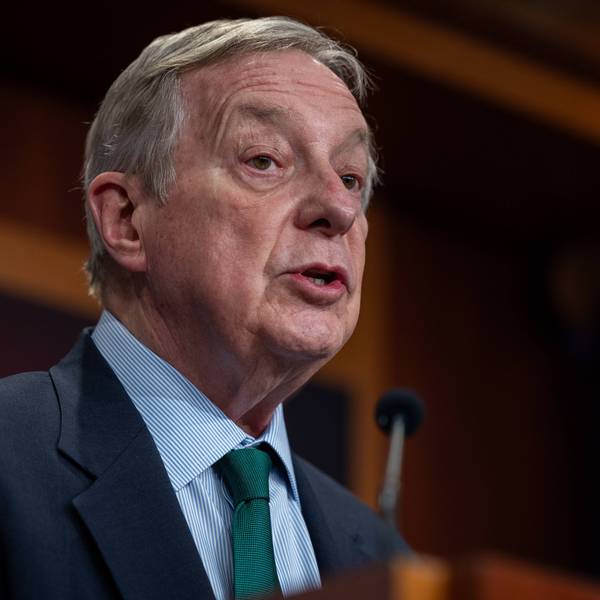
Former U.S. President Donald Trump speaks to reporters after a debate on September 10, 2024 in Philadelphia, Pennsylvania.
First Amendment Advocates Demand Senate Pass PRESS Act Before Trump Takes Office
"Lawmakers and President Biden must act before it's too late," said Trevor Timm of Freedom of the Press Foundation.
Press freedom advocates on Friday called on the Senate to urgently pass a bipartisan bill aimed at protecting reporters from government overreach and spying before what one group called "an anti-press extremist obsessed with punishing journalists and news outlets who criticize him" takes office as the next president of the United States.
National civil liberties group Defending Rights & Dissent said Republican President-elect Donald Trump's hostility toward the press as well as the plans outlined in the right-wing agenda Project 2025 make it imperative for the Democratic-led Senate to pass the Protect Reporters from Exploitative State Spying (PRESS) Act.
The bill would shield reporters from surveillance aimed at finding out their sources.
"With many purportedly concerned about how Trump may impact our free press, it is unthinkable to allow a bill with as much bipartisan support as the PRESS Act to wither away and die," said Chip Gibbons, policy director for the group.
Project 2025, which was co-authored by at least 140 people who worked in the first Trump administration, calls to rescind the Department of Justice's current guidelines limiting when a journalist's communications records can be obtained by the federal government or when they can be compelled to testify.
"Trump has spent the last year on the campaign trail calling for more leak investigations, imprisoning journalists, and censoring news outlets he doesn't like."
"While administrations from both parties have made it the norm to use the Espionage Act to imprison whistleblowers, thus opening the door for surveillance of journalists," said Gibbons, "Project 2025 proposes undoing one of the only guardrails limiting this assault on democracy."
Trump has frequently expressed anger over journalists' coverage of him, and days before the election, he said he wouldn't "mind" if reporters at his rally were killed.
"Trump has spent the last year on the campaign trail calling for more leak investigations, imprisoning journalists, and censoring news outlets he doesn't like," said Trevor Timm, executive director of Freedom of the Press Foundation (FPF). "Lawmakers and President [Joe] Biden must act before it's too late."
On Friday, FPF director of advocacy Seth Stern wrote that investigative journalist Catherine Herridge would be protected from government surveillance if the PRESS Act, which was unanimously passed by the House earlier this year, were signed into law.
The federal appellate court for the D.C. Circuit is expected to hold a secret hearing on November 18 about whether Herridge can be fined $800 per day for refusing to comply with a judicial order to disclose her sources for a story about a university president's alleged ties to the Chinese military.
"If the court rules against Herridge, every potential government whistleblower in the nation's capital will think twice before talking to journalists in confidence. That means that in the second Trump administration, we'll all know less about government waste, corruption, and malfeasance," wrote Stern. "Congress could moot all of this by passing the PRESS Act, the federal shield bill that would protect journalist-source confidentiality."
Gibbons called on Senate leaders to "act now and pass this legislation before Trump can enact Project 2025’s plans to turn counter intelligence surveillance against U.S. journalists."
An Urgent Message From Our Co-Founder
Dear Common Dreams reader, The U.S. is on a fast track to authoritarianism like nothing I've ever seen. Meanwhile, corporate news outlets are utterly capitulating to Trump, twisting their coverage to avoid drawing his ire while lining up to stuff cash in his pockets. That's why I believe that Common Dreams is doing the best and most consequential reporting that we've ever done. Our small but mighty team is a progressive reporting powerhouse, covering the news every day that the corporate media never will. Our mission has always been simple: To inform. To inspire. And to ignite change for the common good. Now here's the key piece that I want all our readers to understand: None of this would be possible without your financial support. That's not just some fundraising cliche. It's the absolute and literal truth. We don't accept corporate advertising and never will. We don't have a paywall because we don't think people should be blocked from critical news based on their ability to pay. Everything we do is funded by the donations of readers like you. Will you donate now to help power the nonprofit, independent reporting of Common Dreams? Thank you for being a vital member of our community. Together, we can keep independent journalism alive when it’s needed most. - Craig Brown, Co-founder |
Press freedom advocates on Friday called on the Senate to urgently pass a bipartisan bill aimed at protecting reporters from government overreach and spying before what one group called "an anti-press extremist obsessed with punishing journalists and news outlets who criticize him" takes office as the next president of the United States.
National civil liberties group Defending Rights & Dissent said Republican President-elect Donald Trump's hostility toward the press as well as the plans outlined in the right-wing agenda Project 2025 make it imperative for the Democratic-led Senate to pass the Protect Reporters from Exploitative State Spying (PRESS) Act.
The bill would shield reporters from surveillance aimed at finding out their sources.
"With many purportedly concerned about how Trump may impact our free press, it is unthinkable to allow a bill with as much bipartisan support as the PRESS Act to wither away and die," said Chip Gibbons, policy director for the group.
Project 2025, which was co-authored by at least 140 people who worked in the first Trump administration, calls to rescind the Department of Justice's current guidelines limiting when a journalist's communications records can be obtained by the federal government or when they can be compelled to testify.
"Trump has spent the last year on the campaign trail calling for more leak investigations, imprisoning journalists, and censoring news outlets he doesn't like."
"While administrations from both parties have made it the norm to use the Espionage Act to imprison whistleblowers, thus opening the door for surveillance of journalists," said Gibbons, "Project 2025 proposes undoing one of the only guardrails limiting this assault on democracy."
Trump has frequently expressed anger over journalists' coverage of him, and days before the election, he said he wouldn't "mind" if reporters at his rally were killed.
"Trump has spent the last year on the campaign trail calling for more leak investigations, imprisoning journalists, and censoring news outlets he doesn't like," said Trevor Timm, executive director of Freedom of the Press Foundation (FPF). "Lawmakers and President [Joe] Biden must act before it's too late."
On Friday, FPF director of advocacy Seth Stern wrote that investigative journalist Catherine Herridge would be protected from government surveillance if the PRESS Act, which was unanimously passed by the House earlier this year, were signed into law.
The federal appellate court for the D.C. Circuit is expected to hold a secret hearing on November 18 about whether Herridge can be fined $800 per day for refusing to comply with a judicial order to disclose her sources for a story about a university president's alleged ties to the Chinese military.
"If the court rules against Herridge, every potential government whistleblower in the nation's capital will think twice before talking to journalists in confidence. That means that in the second Trump administration, we'll all know less about government waste, corruption, and malfeasance," wrote Stern. "Congress could moot all of this by passing the PRESS Act, the federal shield bill that would protect journalist-source confidentiality."
Gibbons called on Senate leaders to "act now and pass this legislation before Trump can enact Project 2025’s plans to turn counter intelligence surveillance against U.S. journalists."
- Tom Cotton Blocks Senate PRESS Act Designed to Protect Journalists ›
- Trump Calls On GOP to Kill Bill Designed to Protect Journalists | Common Dreams ›
- Once Again, Tom Cotton Blocks Bill to Shield Journalists From Betraying Sources | Common Dreams ›
Press freedom advocates on Friday called on the Senate to urgently pass a bipartisan bill aimed at protecting reporters from government overreach and spying before what one group called "an anti-press extremist obsessed with punishing journalists and news outlets who criticize him" takes office as the next president of the United States.
National civil liberties group Defending Rights & Dissent said Republican President-elect Donald Trump's hostility toward the press as well as the plans outlined in the right-wing agenda Project 2025 make it imperative for the Democratic-led Senate to pass the Protect Reporters from Exploitative State Spying (PRESS) Act.
The bill would shield reporters from surveillance aimed at finding out their sources.
"With many purportedly concerned about how Trump may impact our free press, it is unthinkable to allow a bill with as much bipartisan support as the PRESS Act to wither away and die," said Chip Gibbons, policy director for the group.
Project 2025, which was co-authored by at least 140 people who worked in the first Trump administration, calls to rescind the Department of Justice's current guidelines limiting when a journalist's communications records can be obtained by the federal government or when they can be compelled to testify.
"Trump has spent the last year on the campaign trail calling for more leak investigations, imprisoning journalists, and censoring news outlets he doesn't like."
"While administrations from both parties have made it the norm to use the Espionage Act to imprison whistleblowers, thus opening the door for surveillance of journalists," said Gibbons, "Project 2025 proposes undoing one of the only guardrails limiting this assault on democracy."
Trump has frequently expressed anger over journalists' coverage of him, and days before the election, he said he wouldn't "mind" if reporters at his rally were killed.
"Trump has spent the last year on the campaign trail calling for more leak investigations, imprisoning journalists, and censoring news outlets he doesn't like," said Trevor Timm, executive director of Freedom of the Press Foundation (FPF). "Lawmakers and President [Joe] Biden must act before it's too late."
On Friday, FPF director of advocacy Seth Stern wrote that investigative journalist Catherine Herridge would be protected from government surveillance if the PRESS Act, which was unanimously passed by the House earlier this year, were signed into law.
The federal appellate court for the D.C. Circuit is expected to hold a secret hearing on November 18 about whether Herridge can be fined $800 per day for refusing to comply with a judicial order to disclose her sources for a story about a university president's alleged ties to the Chinese military.
"If the court rules against Herridge, every potential government whistleblower in the nation's capital will think twice before talking to journalists in confidence. That means that in the second Trump administration, we'll all know less about government waste, corruption, and malfeasance," wrote Stern. "Congress could moot all of this by passing the PRESS Act, the federal shield bill that would protect journalist-source confidentiality."
Gibbons called on Senate leaders to "act now and pass this legislation before Trump can enact Project 2025’s plans to turn counter intelligence surveillance against U.S. journalists."
- Tom Cotton Blocks Senate PRESS Act Designed to Protect Journalists ›
- Trump Calls On GOP to Kill Bill Designed to Protect Journalists | Common Dreams ›
- Once Again, Tom Cotton Blocks Bill to Shield Journalists From Betraying Sources | Common Dreams ›

